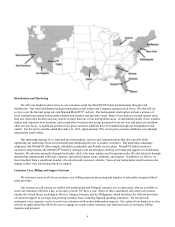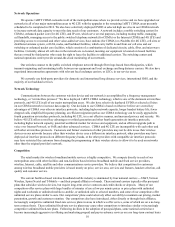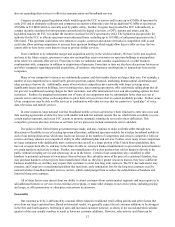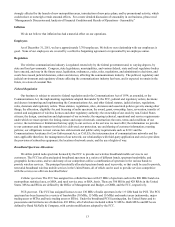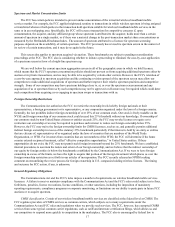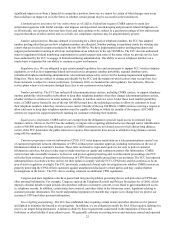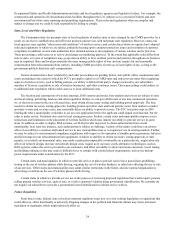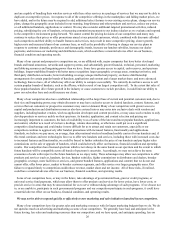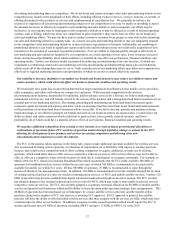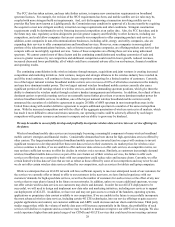Metro PCS 2011 Annual Report Download - page 30
Download and view the complete annual report
Please find page 30 of the 2011 Metro PCS annual report below. You can navigate through the pages in the report by either clicking on the pages listed below, or by using the keyword search tool below to find specific information within the annual report.19
appealing the automatic data roaming rules before the U.S. Court of Appeals for the District of Columbia Circuit. We cannot
predict with any certainty the outcome of such appeal.
In its approval of the Verizon Wireless purchase of Alltel Wireless, the FCC imposed conditions that allow carriers like us
who have roaming agreements with both Verizon Wireless and Alltel Wireless to use either agreement to govern all traffic
exchanged with the post-merger Verizon Wireless until January 2013. We have elected to have the Alltel Wireless roaming
agreement govern all of our roaming traffic with the combined Verizon Wireless-Alltel. We and others have asked the FCC to
clarify these requirements, to extend the current commitment to January 2016 and to require post-merger Verizon Wireless to
offer automatic roaming for data services and features on a non-discriminatory basis. The FCC has not acted on this extension
request and, to date, Verizon Wireless has not agreed to negotiate modified terms or an extended date for the current agreement
or to include data services.
National Broadband Plan. The American Recovery and Reinvestment Act of 2009, or Recovery Act, required the FCC to
coordinate with NTIA, to establish a National Broadband Plan and benchmarks designed to ensure that all people of the United
States have access to broadband capability. The resulting National Broadband Plan, which was released on March 16, 2010,
makes numerous recommendations to the FCC, Congress and other regulatory agencies in an effort to promote broadband
deployment. For instance, the National Broadband Plan recommends that the FCC make available 500 MHz of additional
spectrum for mobile broadband wireless services within the next ten years, of which 300 MHz is recommended to be made
available for mobile use within five years. The National Broadband Plan also makes recommendations regarding FCC action
in the areas of intercarrier compensation, universal service, increasing competition, and a number of other regulatory issues.
The FCC has initiated various regulatory proceedings in an effort to implement certain recommendations in the National
Broadband Plan and the FCC has acted on some of these recommendations, but the timing of any FCC action on the remaining
recommendations is uncertain. “See - Interconnection and Universal Service Fund.”
Network Management and Net Neutrality. In December 2010, the FCC adopted net neutrality regulations that go further
than the FCC's existing Internet policy and apply to broadband wireless Internet access services, including those offered by us.
These rules codified a number of the FCC's prior open Internet policy principles, and added additional nondiscrimination and
transparency requirements. The transparency rule, which applies to both fixed and mobile wireless Internet access service
providers, requires providers to make available relevant information regarding network management practices to the consumers
who purchase their services, and to content, application and service providers who seek access to a carrier's network. In other
respects, the new rules differ for wireline broadband Internet providers, such as cable companies and wireline telephone
companies, and for mobile wireless broadband Internet providers, such as us. Fixed wireline broadband Internet providers are
not allowed to block lawful content, applications, services, or non-harmful devices, and cannot unreasonably discriminate in
transmitting lawful network traffic over a consumer's broadband Internet access service. Mobile wireless broadband Internet
providers are not subject to the broader wireline non-discrimination requirement, but wireless providers cannot block
consumers from accessing lawful websites, nor block applications that compete with the provider's voice or video telephony
services. The rules for both fixed and wireless providers are also subject to reasonable network management provisions. All of
the rules noted above are also subject to the needs of law enforcement, public safety and homeland and national security. These
rules became effective on November 20, 2011. MetroPCS, Verizon Wireless and a number of public interest organizations have
filed appeals of the FCC's rules in the U.S. Court of Appeals for the District of Columbia Circuit. We cannot predict with any
certainly the outcome of such appeals. Several public interest groups have sent letters to the FCC alleging that certain 4G LTE
rate plans offered by us violate the new net neutrality regulations and have asked the FCC to investigate. We have responded to
these allegations at the FCC as we believe our 4G LTE rate plans do not violate the net neutrality rules and regulations. We
cannot predict with any certainty the outcome of such letters or the timing of any such resolution.
Interconnection. FCC rules provide that all telecommunications carriers are obligated upon reasonable request to
interconnect directly or indirectly with the facilities and networks of other telecommunications carriers. All LECs also must,
upon request, enter into mutual or reciprocal compensation arrangements with CMRS carriers for the exchange of intra-MTA
traffic. Under the revised intercarrier compensation regime adopted by the FCC in October 2011, where there is no pre-existing
agreement between the carriers as of December 2011 for the exchange of intraMTA traffic, such traffic between CMRS
providers and most LECs is to be compensated pursuant to a bill-and-keep regime in which each provider receives
compensation for any costs associated with transporting and terminating calls from their own end user customers. CMRS
carriers also have an obligation to engage in voluntary negotiation and may be subject to arbitration with incumbent local
exchange carriers similar to those imposed on the incumbent local exchange carriers pursuant to Section 252 of the
Communications Act if the parties do not reach agreement. Once an incumbent local exchange carrier requests negotiation of
an interconnection arrangement, both carriers are obligated to begin paying the FCC's default rates for all intra-MTA traffic
exchanged after the request for negotiation. Since 2005, no LEC has been permitted to impose rates by state tariff on a going-
forward basis for the termination of a CMRS carrier's intra-MTA traffic. We generally have been successful in negotiating
arrangements with carriers with whom we exchange intra-MTA traffic, but we expect most parties to eventually reach the bill-


